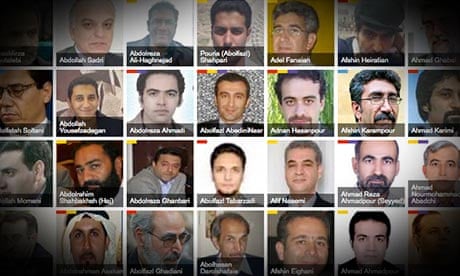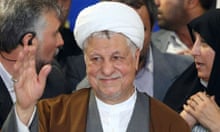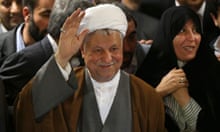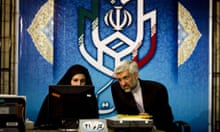Iran has launched a public crackdown on dissent before next month's presidential election, executing two men charged with espionage and waging war against God, arresting a group of activists and summoning campaigners for questioning. Political prisoners in some of the country's most notorious jails have had their parole or visiting rights withdrawn and some transferred to solitary confinement.
Human rights campaigners in Iran, speaking on condition of anonymity, say state repression has intensified in the runup to the polls on 14 June amid authorities' concern of a repeat of the anti-government protests that followed the 2009 election, which was described as a sedition led by the country's foreign enemies.
The crackdown comes as the Guardian launches an online database that catalogues the extent of repression by the Iranian authorities. The research shows there are 2,600 prisoners of conscience in the country, among them hundreds of activists, scores of students, dozens of women's rights campaigners, lawyers, artists, former politicians and many members of the country's religious and ethnic minorities.
After the 2009 election, which gave president Mahmoud Ahmadinejad a second term in office, thousands of Green movement activists took to the streets to protest against the official results, which they alleged had been rigged. They were met by anti-riot forces who killed dozens of protesters and arrested hundreds more.
Those still in jail include at least 391 students, 90 teachers and professors, 65 writers, poets and film-makers, 20 lawyers and 131 identified as journalists or bloggers. But almost 1,900 prisoners are either awaiting sentencing or the details of their jail terms have not been publicly disclosed. Most of them were sentenced under vague charges, such as acting against the national security or propaganda against the regime, and have been denied adequate legal representation.
Of the religious and ethnic minorities in Iranian prisons, at least 572 are Kurds, 203 Arabs, 192 Azeris, 240 Baha'is, 13 Balouchs, 40 Christians, 98 Sufis, two Zoroastrians and one Jew, the research shows.
The Guardian database only shows details for 870 prisoners whose identity and circumstances appear to be clear.
Anita Hunt, a researcher who has focused on documenting the arrests of Iranian activists and tracking their situation since 2009, said: "There's a tendency to assume protests are confined to educated, middle-class youth, but the list [of prisoners in the interactive] tells us a different story. To me, this is evidence that what happened in 2009 was really a popular uprising across many sectors of society in Iran.
"The dissent has been muffled by constant systematic repression, but as long as we remember these prisoners, it has not been silenced. Behind the numbers and statistics are thousands of stories of real people enduring physical and mental torture and so many kinds of deprivation."
With the general election fast approaching, the authorities appear to be worried about any repeat of the events of 2009.
Student activist Bahareh Hedayat, journalists Ahmad Zeyed-Abadi, Bahman Ahmadi-Amoui and Masoud Bastani are among the people who were all arrested in the 2009 post-election crackdown but have had their parole cancelled this week. Bastani and his wife, Mahsa Amr-Abadi, who is also a journalist, have since spent most of their time in jail, only seeing each other for few hours.
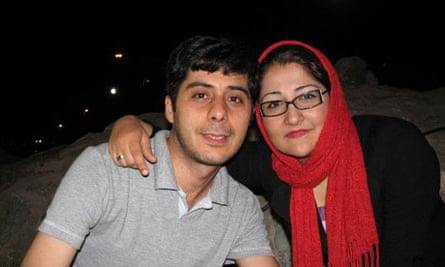
The opposition website Kaleme also reported on Monday that a number of activists have been arrested in Iranian provinces and some summoned for questioning. Ali Ghazali, the editor of the conservative website, Baztab, also remains in jail since his arrest in early May. Meanwhile, Iran News Network, a pro-government website, reported that several campaigners sympathetic to president Mahmoud Ahmadinejad and his favourite candidate, Esfandiar Rahim Mashaei, have also been arrested by the authorities and many called in for interrogation.
Hossein Ronaghi Maleki, a 28-year-old blogger who spent 376 days in solitary confinement after his arrest in 2009, has notified friends via Facebook that he was due to return to jail despite his deteriorating health condition. In jail, he developed a kidney disease and was operated on at least four times. He has staged a number of hunger strikes in protest at his 15-year jail sentence.
Ronaghi Maleki, an expert in computer programming and setting up websites aimed at circumventing online censorship, was sentenced to 15 years in jail in 2010 on charges of "spreading propaganda against the regime", "membership of the internet group Iran Proxy" and "insulting the Iranian supreme leader [Ayatollah Ali Khamenei] and the president [Mahmoud Ahmadinejad]".
During his time out, Ronaghi Maleki wrote a letter to his interrogator in which he said: "We are worried about Iran and Iranians, we are not the enemy!"
Kouhyar Goudarzi, a 27-year-old journalist from the Committee for Human Rights Reporters (CHRR) in Iran, was sentenced to five years in jail in March 2012 but fled Iran to Turkey while on a temporarily leave from prison. The CHRR was established in 2004 with the aim of reporting violations of human rights in Iran.
He said that members of the CHRR have received a combined total of 50 years in jail, including Saeed Jalilifar, who is serving a three-year sentence, Shiva Nazar-Ahari four years, Navid Khanjani 12 years and Saeed Haeri two years.
While in jail, Goudarzi said, he was put under pressure to give a false confession against himself and his friends. "I was held in solitary confinement and taken to interrogation sessions every morning. My interrogator would throw a piece of paper in front of me and leave me in the room for 12 hours with a radio on constantly playing static noises."
He said: "I used to collapse and experience convulsions but the prison's doctor only increased the dose of my medicine so I could resist more under interrogations instead of asking them to treat me better."
